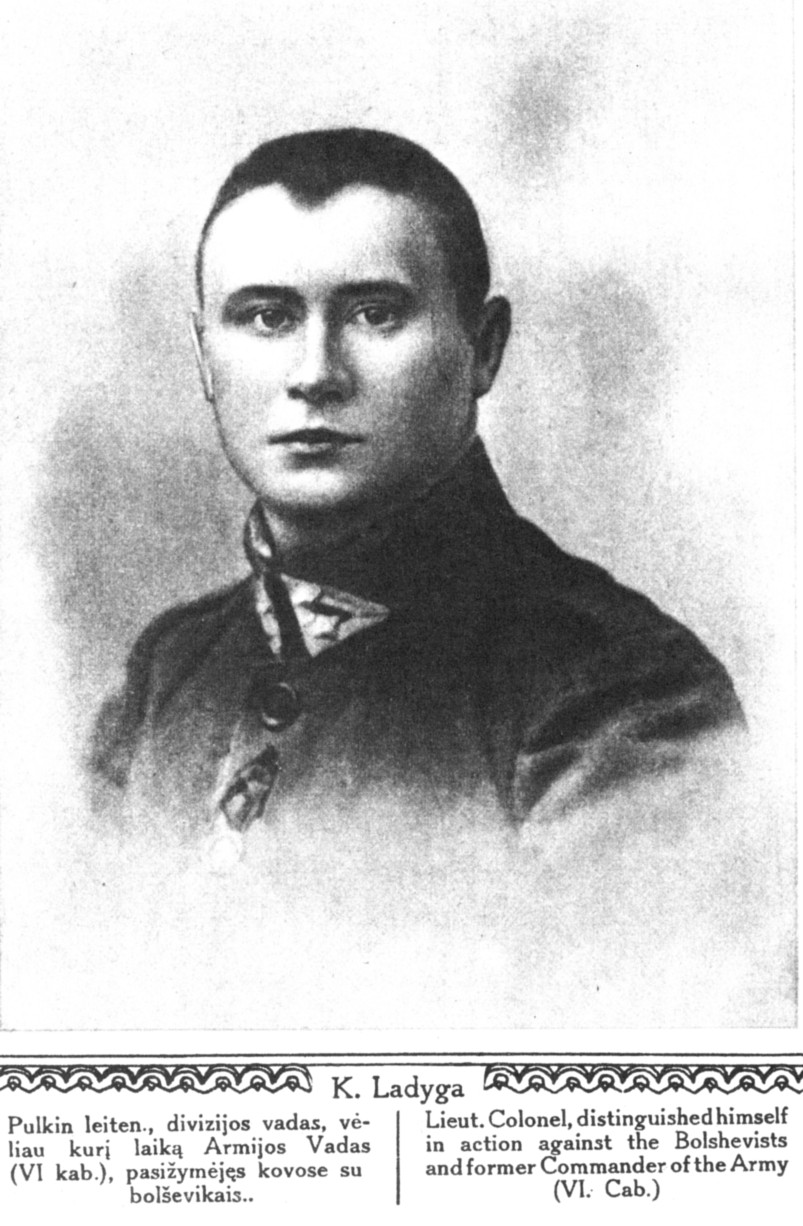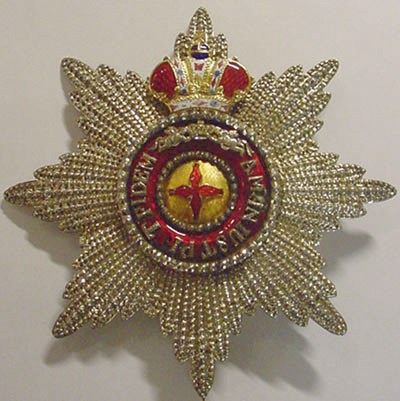|
Antanas Juozapavičius
Antanas Juozapavičius (13 February 1894 – 13 February 1919) was the first officer of the Army of the Republic of Lithuania to die while fighting in the Lithuanian Wars of Independence. Biography Antanas Juozapavičius was born to Juozapas Juozapavičius and his wife Marijona Juozapavičienė. He was born in the small Švakštonys manor, which the parents were renting. As farming was financially unsuccessful, the family emigrated to Riga, where Juozapas Juozapavičius worked as a wagoner. In 1902, Antanas Juozapavičius started going to school in Riga, and from 1905 to , although he was thrown out of school in sixth grade for the spreading of Lithuanian ideas. In Tartu, he educated to become a pharmacist, and from 1914 onwards worked as such in the pharmacies of Riga and Tartu. World War I After World War I started, in 1915 he enlisted as a volunteer of the Imperial Russian Army. After a few months he was sent to the Moscow military school, graduating as a Praporshchik, ... [...More Info...] [...Related Items...] OR: [Wikipedia] [Google] [Baidu] |
Russian Empire
The Russian Empire was an empire and the final period of the List of Russian monarchs, Russian monarchy from 1721 to 1917, ruling across large parts of Eurasia. It succeeded the Tsardom of Russia following the Treaty of Nystad, which ended the Great Northern War. The rise of the Russian Empire coincided with the decline of neighbouring rival powers: the Swedish Empire, the Polish–Lithuanian Commonwealth, Qajar Iran, the Ottoman Empire, and Qing dynasty, Qing China. It also held colonies in North America between 1799 and 1867. Covering an area of approximately , it remains the list of largest empires, third-largest empire in history, surpassed only by the British Empire and the Mongol Empire; it ruled over a population of 125.6 million people per the Russian Empire Census, 1897 Russian census, which was the only census carried out during the entire imperial period. Owing to its geographic extent across three continents at its peak, it featured great ethnic, linguistic, re ... [...More Info...] [...Related Items...] OR: [Wikipedia] [Google] [Baidu] |
1894 Births
Events January–March * January 4 – A military alliance is established between the French Third Republic and the Russian Empire. * January 7 – William Kennedy Dickson receives a patent for motion picture film in the United States. * January 9 – New England Telephone and Telegraph installs the first battery-operated telephone switchboard, in Lexington, Massachusetts. * February 12 ** French anarchist Émile Henry sets off a bomb in a Paris café, killing one person and wounding twenty. ** The barque ''Elisabeth Rickmers'' of Bremerhaven is wrecked at Haurvig, Denmark, but all crew and passengers are saved. * February 15 ** In Korea, peasant unrest erupts in the Donghak Peasant Revolution, a massive revolt of followers of the Donghak movement. Both China and Japan send military forces, claiming to come to the ruling Joseon dynasty government's aid. ** At 04:51 GMT, French anarchist Martial Bourdin dies of an accidental detonation of his own ... [...More Info...] [...Related Items...] OR: [Wikipedia] [Google] [Baidu] |
Russian Military Personnel Of World War I
Russian(s) refers to anything related to Russia, including: *Russians (, ''russkiye''), an ethnic group of the East Slavic peoples, primarily living in Russia and neighboring countries * Rossiyane (), Russian language term for all citizens and people of Russia, regardless of ethnicity * Russophone, Russian-speaking person (, ''russkogovoryashchy'', ''russkoyazychny'') * Russian language, the most widely spoken of the Slavic languages * Russian alphabet * Russian cuisine * Russian culture * Russian studies Russian may also refer to: * Russian dressing *''The Russians'', a book by Hedrick Smith * Russian (comics), fictional Marvel Comics supervillain from ''The Punisher'' series * Russian (solitaire), a card game * "Russians" (song), from the album ''The Dream of the Blue Turtles'' by Sting *"Russian", from the album '' Tubular Bells 2003'' by Mike Oldfield *"Russian", from the album '' '' by Caravan Palace * Nik Russian, the perpetrator of a con committed in 2002 *The South Africa ... [...More Info...] [...Related Items...] OR: [Wikipedia] [Google] [Baidu] |
Lithuanian Army Officers
Lithuanian may refer to: * Lithuanians * Lithuanian language * The country of Lithuania Lithuania (; lt, Lietuva ), officially the Republic of Lithuania ( lt, Lietuvos Respublika, links=no ), is a country in the Baltic region of Europe. It is one of three Baltic states and lies on the eastern shore of the Baltic Sea. Lithuania ... * Grand Duchy of Lithuania * Culture of Lithuania * Lithuanian cuisine * Lithuanian Jews as often called "Lithuanians" (''Lita'im'' or ''Litvaks'') by other Jews, sometimes used to mean Mitnagdim See also * List of Lithuanians {{disambig Language and nationality disambiguation pages ... [...More Info...] [...Related Items...] OR: [Wikipedia] [Google] [Baidu] |
Kazys Ladiga
Kazys Ladiga (25 December 1893 in Iškonys near Biržai – 19 December 1941 in Irkutsk) was a Lithuanian general and one of the first volunteer officers of the Lithuanian army. Upon graduating from the Military Academy in Vilnius, Ladiga served in the Imperial Russian army during World War I and earned the rank of captain. He returned to Lithuania in 1918 and volunteered to the newly formed Lithuanian army. He was appointed as the commander of one of the battalions of the 1st Infantry Regiment. Ladiga quickly rose through the ranks and commanded the Vilkmergė Group in the Lithuanian–Soviet War. He also led units against the Bermontians and in the Polish–Lithuanian War. After an unsuccessful campaign in September 1920, Ladiga resigned field office and joined the General Staff in Kaunas. After the Lithuanian Wars of Independence he continued military studies in Switzerland and Czechoslovakia. He rose to the rank of a general and briefly served as the Chief of the General ... [...More Info...] [...Related Items...] OR: [Wikipedia] [Google] [Baidu] |
Vilnius
Vilnius ( , ; see also other names) is the capital and largest city of Lithuania, with a population of 592,389 (according to the state register) or 625,107 (according to the municipality of Vilnius). The population of Vilnius's functional urban area, which stretches beyond the city limits, is estimated at 718,507 (as of 2020), while according to the Vilnius territorial health insurance fund, there were 753,875 permanent inhabitants as of November 2022 in Vilnius city and Vilnius district municipalities combined. Vilnius is situated in southeastern Lithuania and is the second-largest city in the Baltic states, but according to the Bank of Latvia is expected to become the largest before 2025. It is the seat of Lithuania's national government and the Vilnius District Municipality. Vilnius is known for the architecture in its Old Town, declared a UNESCO World Heritage Site in 1994. The city was noted for its multicultural population already in the time of the Polish–Li ... [...More Info...] [...Related Items...] OR: [Wikipedia] [Google] [Baidu] |
1st Infantry Regiment (Lithuania)
The 1st Infantry Regiment (), later the 1st Infantry Regiment of the Lithuanian Grand Duke Gediminas () was an infantry regiment that served in the Lithuanian Army during the Interwar period. Formation was made the regiment's commander on 1 November 1918. The regiment began forming in Vilnius, although in a covert manner, because the occupying German authorities hampered the formation of the Lithuanian Army. So, the regiment officially began forming only on 23 November 1918. On December 7, the regiment included 31 officers and 59 soldiers. In ten days, the number gradually increased to 33 officers, 3 military officials (), military doctor L. Janulionis and 87 soldiers. Lithuanian–Soviet War By 11 February 1919, the regiment had 36 officers, 13 military officials, one military doctor and 678 soldiers. At the time, the regiment was divided into two battalions, with the first one, led by the officer , being composed of two infantry and one machine gun companies, while ... [...More Info...] [...Related Items...] OR: [Wikipedia] [Google] [Baidu] |
Augustinas Voldemaras
Augustinas Voldemaras (16 April 1883 – 16 May 1942) was a Lithuanian nationalist political figure. He briefly served as the country's first prime minister in 1918 and continued serving as the minister of foreign affairs until 1920, representing the fledgling Lithuanian state at the Versailles Peace Conference and the League of Nations. After some time in academia, Voldemaras returned to politics in 1926, when he was elected to the Third Seimas. Dissatisfied with the left-wing government of President Kazys Grinius, Voldemaras and fellow nationalist Antanas Smetona supported the military coup d'état in December 1926 and he was appointed as the prime minister for a second time. A brilliant orator, Voldemaras represented the radical wing of the Lithuanian Nationalist Union that was increasingly critical of the more moderate policies of President Smetona. Smetona had Voldemaras removed from office in September 1929 and exiled to Zarasai. Voldemaras was arrested in 1934 after t ... [...More Info...] [...Related Items...] OR: [Wikipedia] [Google] [Baidu] |
Adjutant
Adjutant is a military appointment given to an officer who assists the commanding officer with unit administration, mostly the management of human resources in an army unit. The term is used in French-speaking armed forces as a non-commissioned officer rank similar to a staff sergeant or warrant officer but is not equivalent to the role or appointment of an adjutant. An adjutant general is commander of an army's administrative services. Etymology Adjutant comes from the Latin ''adiutāns'', present participle of the verb ''adiūtāre'', frequentative form of ''adiuvāre'' 'to help'; the Romans actually used ''adiūtor'' for the noun. Military and paramilitary appointment In various uniformed hierarchies, the term is used for number of functions, but generally as a principal aide to a commanding officer. A regimental adjutant, garrison adjutant etc. is a staff officer who assists the commanding officer of a regiment, battalion or garrison in the details of regimental, ... [...More Info...] [...Related Items...] OR: [Wikipedia] [Google] [Baidu] |
February Revolution
The February Revolution ( rus, Февра́льская револю́ция, r=Fevral'skaya revolyutsiya, p=fʲɪvˈralʲskəjə rʲɪvɐˈlʲutsɨjə), known in Soviet historiography as the February Bourgeois Democratic Revolution and sometimes as the March Revolution, was the first of two revolutions which took place in Russia in 1917. The main events of the revolution took place in and near Petrograd (present-day Saint Petersburg), the then-capital of Russia, where long-standing discontent with the monarchy erupted into mass protests against food rationing on 23 February Old Style (8 March New Style). Revolutionary activity lasted about eight days, involving mass demonstrations and violent armed clashes with police and gendarmes, the last loyal forces of the Russian monarchy. On 27 February O.S. (12 March N.S.) the forces of the capital's garrison sided with the revolutionaries. Three days later Tsar Nicholas II abdicated, ending Romanov dynastic rule and the Russia ... [...More Info...] [...Related Items...] OR: [Wikipedia] [Google] [Baidu] |
Order Of Saint Anna
The Imperial Order of Saint Anna (russian: Орден Святой Анны; also "Order of Saint Anne" or "Order of Saint Ann") was a Holstein ducal and then Russian imperial order of chivalry. It was established by Karl Friedrich, Duke of Holstein-Gottorp, on 14 February 1735, in honour of his wife Anna Petrovna, daughter of Peter the Great of Russia. Originally, the Order of Saint Anna was a dynastic order of knighthood; but between 1797 and 1917 it had dual status as a dynastic order and as a state order. The Order of St. Anna continued to be awarded after the revolution by Grand Duke Kirill Vladimirovich, Grand Duke Vladimir Kirillovich, and Grand Duchess Maria Vladimirovna. Today, the Russian Imperial Order of St. Anna, awarded by Grand Duchess Maria Vladimirovna is recognized as an order of chivalry by the privately operated ICOC as a continuation of the pre-Revolutionary order, and has been approved for wear with military uniform by the Russian Federation, but not by s ... [...More Info...] [...Related Items...] OR: [Wikipedia] [Google] [Baidu] |






